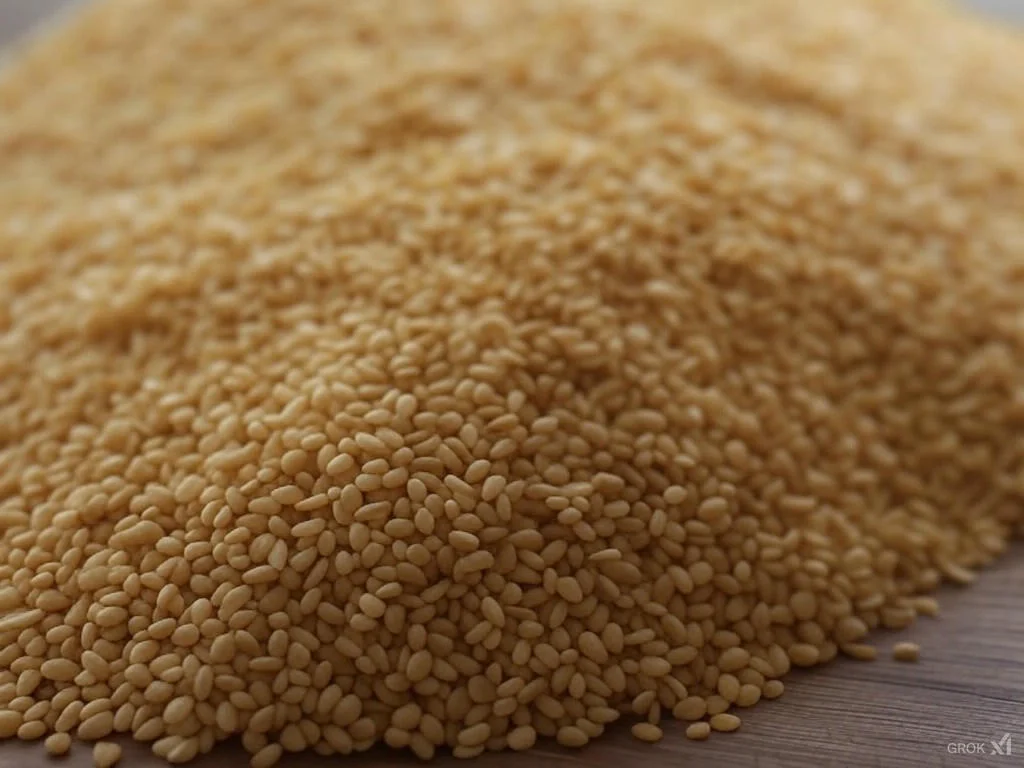Sesame Seeds: A Tiny Superfood with Big Benefits
Introduction

Sesame seeds are small, oil-rich seeds that have been cultivated for thousands of years. They are widely used in different cuisines, from Middle Eastern tahini to Asian stir-fries. These tiny seeds come in various colors, including white, black, and brown, each with its unique flavor and nutritional properties. In this article, we will explore the history, taste, classification, health benefits, and popular recipes featuring sesame seeds.
What Exactly Are Sesame Seeds and Their Origin History?
Sesame seeds come from the Sesamum indicum plant, which is one of the oldest known oilseed crops. Originating in Africa and India, sesame cultivation dates back over 3,000 years. Ancient civilizations, including the Egyptians and Mesopotamians, used sesame for food, oil, and medicinal purposes. Sesame seeds later spread to China, the Middle East, and the Mediterranean, becoming an essential part of many global cuisines.
What Tastes Like Sesame Seeds?
Sesame seeds have a nutty and slightly sweet flavor, which becomes more pronounced when toasted. If you are looking for an alternative with a similar taste, some great options include:
- Sunflower seeds – Mild nuttiness
- Flaxseeds – Earthy and slightly bitter
- Pine nuts – Sweet and nutty
- Poppy seeds – Mildly nutty with a crunch
- Tahini (sesame paste) – A creamy, roasted sesame flavor
Is Sesame Seed a Nut?
No, sesame-seeds are not classified as nuts. They are oilseeds, meaning they belong to a different plant family than tree nuts like almonds or walnuts. However, some people with nut allergies may also be allergic to sesame due to similar proteins found in both.
Is Sesame Seed a Fruit or Vegetable?
Sesame-seeds are neither a fruit nor a vegetable. They are the seeds of the sesame plant, which means they are classified as oilseeds. These seeds grow inside small pods, which dry out and split open when mature.
Are Sesame Seeds Good for You?
Yes! Sesame-seeds are highly nutritious and offer several health benefits:
- Rich in Healthy Fats – Contains monounsaturated and polyunsaturated fats that support heart health.
- High in Protein – Essential for muscle growth and repair.
- Loaded with Antioxidants – Helps fight oxidative stress and inflammation.
- Good for Bone Health – Contains calcium, magnesium, and phosphorus, crucial for strong bones.
- Supports Digestion – High in dietary fiber, aiding in gut health.
- Regulates Blood Sugar – Helps in managing blood sugar levels due to its low glycemic index.
For more scientific information, you can refer to this source: Sesame Seed Nutritional Profile
Is It OK to Eat Raw Sesame Seeds?
Yes, raw sesame-seeds are safe to eat. They retain most of their nutrients in raw form and can be sprinkled over salads, yogurt, or smoothies. However, roasting enhances their flavor and improves digestibility.
Can You Eat Sesame Seeds Untoasted?
Absolutely! Sesame-seeds can be eaten untoasted, though their taste is milder. Many people prefer toasting them to enhance their nutty aroma. If you want a softer texture in dishes like tahini, using raw seeds is a better option.
Famous Recipes with Sesame Seeds
Sesame-seeds are used in many famous recipes worldwide. Here are some of the most popular dishes:
1. Tahini (Middle Eastern)
A creamy paste made from ground sesame-seeds, commonly used in hummus and dressings.
2. Halva (Mediterranean & Middle Eastern)
A sweet confection made from sesame paste, sugar, and nuts.
3. Sesame Chicken (Asian Cuisine)
A crispy chicken dish glazed with a sweet and savory sesame sauce.
4. Gomashio (Japanese Cuisine)
A seasoning blend of toasted sesame-seeds and sea salt, often sprinkled over rice.
5. Benne Wafers (Southern USA)
Thin, crispy cookies made with sesame-seeds, originating from African American culinary traditions.
6. Sesame-Crusted Tuna (Asian Fusion)
Fresh tuna coated with sesame-seeds and lightly seared for a crunchy crust.
7. Sesame Brittle (Global Dessert)
A crunchy candy made with caramelized sugar and sesame-seeds.
Conclusion
Sesame-seeds may be tiny, but they are packed with nutrition, flavor, and history. Whether eaten raw or toasted, used in savory dishes or desserts, sesame-seeds add a unique texture and richness to food. With their long history, health benefits, and versatility in cooking, sesame-seeds remain a valuable ingredient in kitchens worldwide.
FAQ Section
- Do sesame seeds help with weight loss?
Yes! Sesame-seeds are rich in fiber and protein, which can help keep you full for longer, supporting weight management.Source - Are sesame seeds safe for people with allergies?
Sesame-seeds can cause allergic reactions in some individuals, similar to nut allergies. Always check food labels if you’re allergic.Source - What is the best way to store sesame seeds?
Store sesame-seeds in an airtight container in a cool, dry place. Refrigeration can extend their shelf life and prevent rancidity. - Can sesame seeds improve skin and hair health?
Yes! Sesame-seeds contain antioxidants, vitamins, and healthy fats that promote glowing skin and stronger hair.Source - How can I incorporate sesame seeds into my diet?
Sprinkle them on salads, blend into smoothies, mix into baked goods, or use them in stir-fries for extra crunch and flavor. - Do sesame seeds contain calcium?
Yes, sesame-seeds are an excellent source of calcium, making them great for bone health, especially for those on dairy-free diets. - Are black sesame seeds healthier than white sesame seeds?
Black sesame-seeds have slightly more antioxidants and minerals than white sesame-seeds but both are highly nutritious. - Can sesame seeds go bad?
Yes, due to their high oil content, sesame-seeds can turn rancid over time. Proper storage in a cool, dry place is essential. - Do sesame seeds help with digestion?
Yes, the fiber in sesame-seeds supports healthy digestion and can help prevent constipation.Source - Are sesame seeds used in traditional medicine?
Yes, in Ayurveda and Chinese medicine, sesame-seeds are believed to support heart health, digestion, and energy levels.source
Sesame-seeds are a powerhouse ingredient that deserves a place in your diet. Whether used in sweet treats or savory meals, these tiny seeds offer a delicious and nutritious boost!
you may like it

